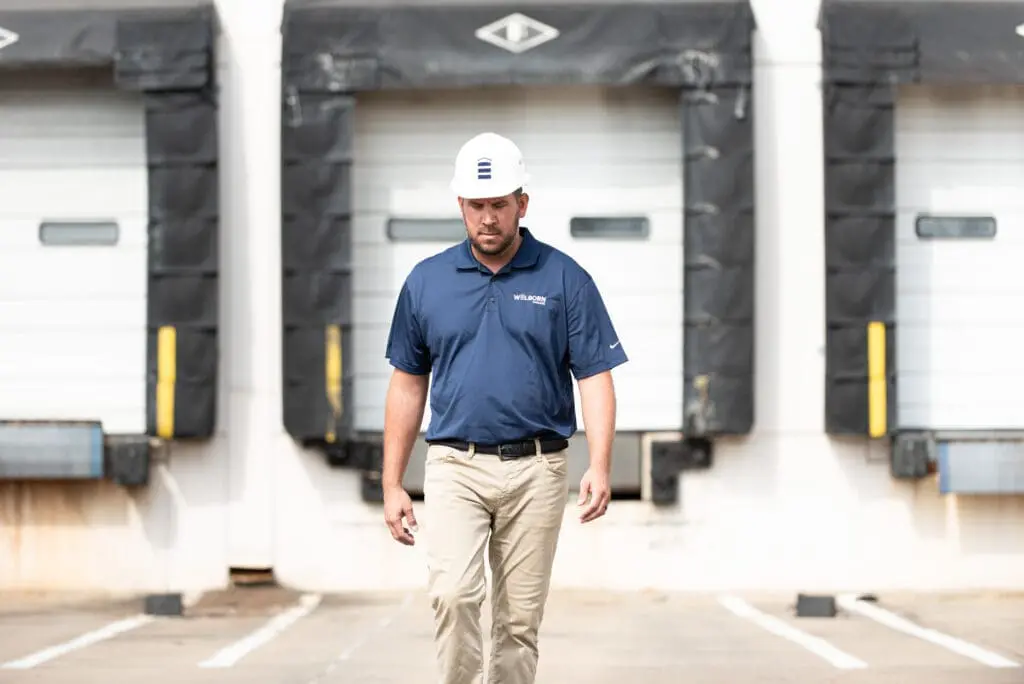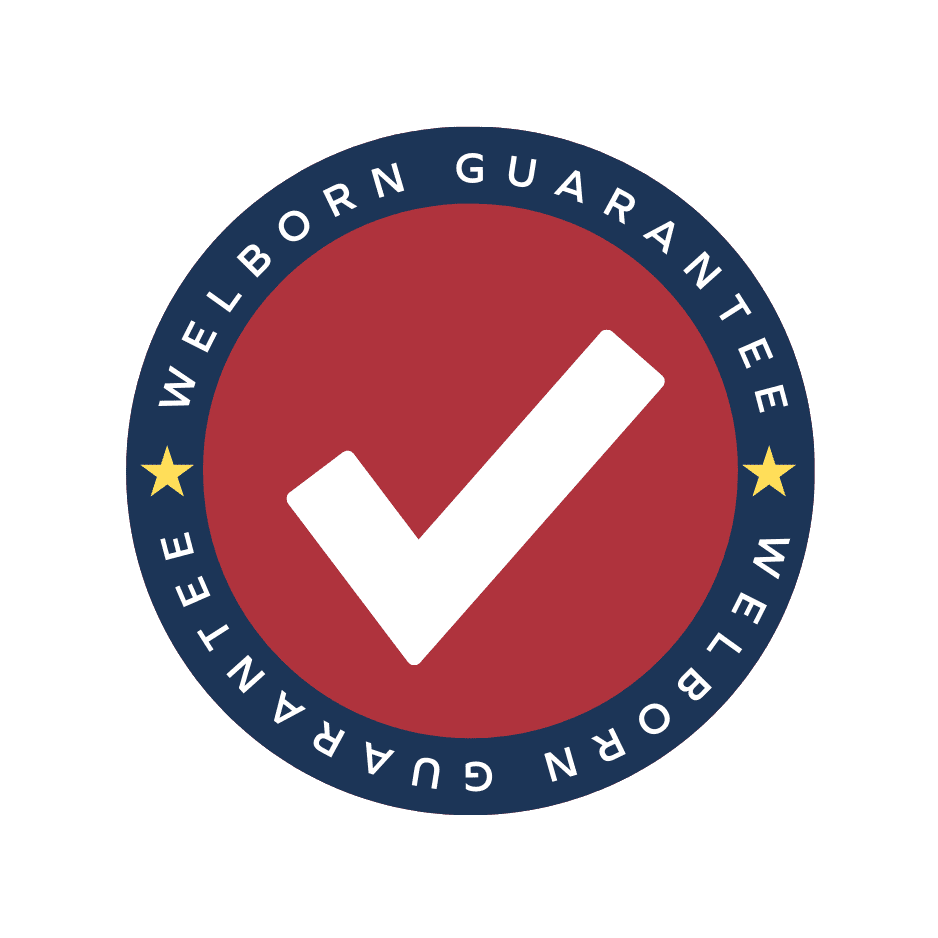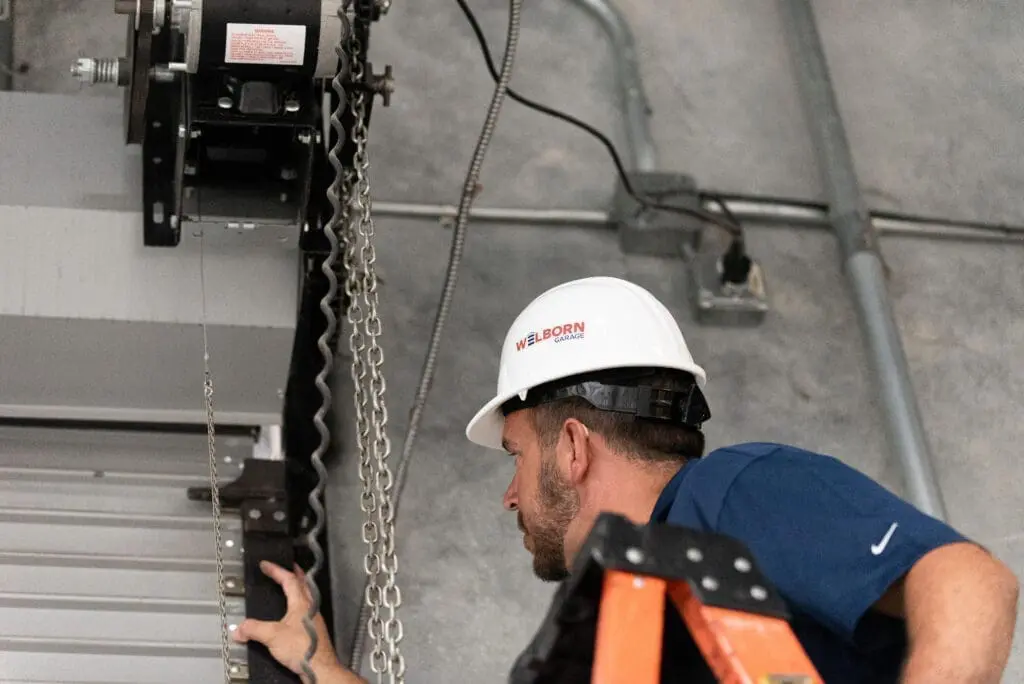Commercial Overhead Door Services In Dallas, TX
Get Same Day, Award Winning, 5- Star Garage Door Service
Commercial Overhead Door Services
In Dallas, TX
Get Same Day, Award Winning, 5- Star Garage Door Service
COMMERCIAL GARAGE DOOR REPAIR
When it comes to keeping your business running smoothly, a malfunctioning garage door is the last thing you need. With Welborn’s expert team of commercial garage door repair technicians and round-the-clock emergency services, we’re here to make sure that your commercial doors are always in top-notch condition. Whether it’s a minor repair or a major overhaul, you can count on us to get the job done quickly, efficiently, and with minimal disruption to your operations.
COMMERCIAL
GARAGE DOOR
REPAIR
When it comes to keeping your business running smoothly, a malfunctioning garage door is the last thing you need. With Welborn’s expert team of commercial garage door repair technicians and round-the-clock emergency services, we’re here to make sure that your commercial doors are always in top-notch condition. Whether it’s a minor repair or a major overhaul, you can count on us to get the job done quickly, efficiently, and with minimal disruption to your operations.
Emergency
REPAIR SERVICE

Welborn is on standby 24/7 to keep your business moving. We know that unexpected garage door issues can throw a wrench into your operations, costing you time and money. That’s why our experienced commercial team is here to provide emergency repair assistance whenever you need it most. Whether it’s a stuck door, a malfunctioning opener, or any other emergency, we’re equipped to tackle problems swiftly and effectively. With our rapid response times and commitment to best-in-class service, you can rest assured that your business is in good hands. Don’t let a garage door emergency slow you down—contact us now for fast and reliable repair solutions that’ll get you back on track in no time.
EMERGENCY
REPAIR SERVICES
Welborn is on standby 24/7 to keep your business moving. We know that unexpected garage door issues can throw a wrench into your operations, costing you time and money. That’s why our experienced commercial team is here to provide emergency repair assistance whenever you need it most. Whether it’s a stuck door, a malfunctioning opener, or any other emergency, we’re equipped to tackle problems swiftly and effectively. With our rapid response times and commitment to best-in-class service, you can rest assured that your business is in good hands. Don’t let a garage door emergency slow you down—contact us now for fast and reliable repair solutions that’ll get you back on track in no time.

THE WELBORN GUARANTEE
Unmatched Warranty
We are so confident in the parts we use and labor we employ that we include a 1-year guarantee on parts and a 30-day guarantee on labor.
CONTACT US TODAY
THE WELBORN GUARANTEE

Unmatched Warranty
We are so confident in the parts we use and labor we employ that we include a 1-year guarantee on parts and a 30-day guarantee on labor
CONTACT US TODAY
TYPE OF
COMMERCIAL
DOORS
Commercial doors come in a variety of types, each serving different purposes and catering to specific needs. Understanding the various types empowers businesses to make informed decisions that align with their operational requirements and preferences.
Roll-Up Doors
These doors are made up of horizontal slats that roll up into a coil when opened. They’re popular in warehouses, storage facilities, and loading docks because they save space and offer durability.
Sectional Doors
Sectional doors consist of multiple horizontal panels that slide up and overhead when opened. They’re versatile and find applications in auto shops, fire stations, and retail stores, providing insulation and security.
High Speed Doors
Engineered for rapid opening and closing, high-speed doors are ideal for environments requiring frequent access. They minimize energy loss and increase efficiency, making them valuable assets in manufacturing facilities, cold storage units, and cleanrooms.
Fire Rated Doors
These doors are specially designed to withstand fire and smoke, offering critical protection in commercial buildings. They’re commonly installed in hospitals, schools, and office buildings to compartmentalize fire hazards and ensure safety.
Glass Doors
These doors are made up of horizontal slats that roll up into a coil when opened. They’re popular in warehouses, storage facilities, and loading docks because they save space and offer durability.
Security Doors
Security doors are fortified with heavy-duty materials and robust locking mechanisms to deter unauthorized access. They’re prevalent in banks, government buildings, and industrial facilities where security is paramount.
Revolving Doors
Engineered for rapid opening and closing, high-speed doors are ideal for environments requiring frequent access. They minimize energy loss and increase efficiency, making them valuable assets in manufacturing facilities, cold storage units, and cleanrooms.
COMMON
COMMERCIAL
DOOR
PROBLEMS
Broken Springs
Commercial doors, particularly roll-up and sectional doors, rely on springs to counterbalance their weight during opening and closing. Over time, these springs can wear out due to constant tension and repeated use. When a spring breaks, it can cause the door to become unbalanced, making it difficult or impossible to open manually. Prompt repair is necessary to replace the broken spring and restore the door’s functionality safely.
Misaligned Tracks
The smooth operation of commercial doors depends on properly aligned tracks that guide their movement. However, factors such as accidental impact, excessive force, or gradual wear and tear can cause tracks to become misaligned or bent. When this occurs, the door may stick, jam, or operate unevenly, posing safety risks and hindering access. Repairing or realigning the tracks ensures smooth door operation and minimizes the risk of further damage.
Damaged Panels
Sectional doors consist of multiple panels that pivot and slide along tracks during operation. These panels are susceptible to damage from impacts, collisions, or harsh weather conditions. Cracked, dented, or broken panels not only compromise the door’s appearance but also affect its structural integrity and insulation properties. Repairing or replacing damaged panels restores the door’s aesthetics and functionality, ensuring proper operation and security.
Malfunctioning Motors
Motorized commercial doors rely on motors, gears, and electrical components to automate the opening and closing process. However, issues such as motor failure, electrical malfunctions, or sensor misalignment can disrupt the door’s operation. A malfunctioning motor may result in the door failing to open or close fully, posing safety hazards and disrupting business operations. Professional repair services can diagnose and address motor-related issues to restore smooth and reliable door operation.
Worn Weatherstripping
Weatherstripping serves a vital role in sealing gaps around doors to prevent air infiltration, moisture intrusion, and debris ingress. Over time, weatherstripping can become worn, cracked, or damaged, compromising its effectiveness. Faulty weatherstripping can lead to energy loss, indoor temperature fluctuations, and increased dust and noise levels. Repairing or replacing worn weatherstripping restores the door’s insulation properties and enhances indoor comfort and energy efficiency.
Broken Cables
Roll-up doors utilize cables to support and control the movement of the door curtain as it rolls up and down. However, cables are susceptible to wear and damage from prolonged use, corrosion, or improper tensioning. Broken or frayed cables can cause the door to operate unevenly, become stuck, or collapse unexpectedly, posing safety risks to personnel and property. Professional repair technicians can assess the condition of the cables and replace them as needed to ensure safe and reliable door operation.
Faulty Locks or Latches
Commercial doors often feature locks or latches to secure the premises and control access. However, over time, these locking mechanisms may experience wear, corrosion, or mechanical failure, compromising their effectiveness. A faulty lock or latch can jeopardize building security, leading to unauthorized access, theft, or vandalism. Repairing or replacing faulty locks or latches restores proper access control and enhances the security of the premises.
Rusted or Corroded Components
Exposure to environmental factors such as moisture, humidity, and corrosive substances can cause metal components of commercial doors, such as hinges, tracks, or hardware, to rust or corrode over time. Rusty or corroded components not only detract from the door’s appearance but also affect its functionality and structural integrity. Regular maintenance and timely repair of rusted or corroded components prevent further deterioration and extend the lifespan of the door.
CONTACT US TODAY
How does a malfunctioning commercial garage door affect my business?
SAFETY
A malfunctioning commercial garage door can jeopardize the safety of employees in several ways. It may suddenly move unpredictably or get stuck, posing a direct risk of accidents or injuries to employees nearby. Additionally, if the door creates uneven surfaces or leaves gaps, employees may trip and fall, especially when carrying heavy items or moving quickly. These falls can result in serious injuries. Moreover, if the door fails to close properly, it could allow hazardous conditions like bad weather or pests to enter the workspace, putting employees’ health at risk. To ensure employee safety, it’s crucial to promptly address any issues with malfunctioning garage doors through regular maintenance and repairs by qualified professionals.
SECURITY
When a commercial garage door isn’t functioning properly, it can have significant implications for the security of the facility. If the door fails to close or lock correctly, it creates an open invitation for unauthorized individuals to enter the premises. This increases the risk of theft, vandalism, or other criminal activities targeting the facility and its assets, putting valuable equipment, inventory, and sensitive information at risk. Failure to address issues with malfunctioning garage doors promptly could lead to non-compliance with regulatory requirements or industry standards related to security and safety. Regular maintenance, inspections, and repairs by qualified professionals are critical in mitigating security risks and ensuring a safe and secure environment for employees, assets, and operations.
SUPPLY CHAIN
A commercial door malfunction can lead to delays in receiving or dispatching goods, disrupting production schedules, inventory levels, and customer orders. This delay can ripple through the supply chain, affecting various stages of the process. The reduced efficiency resulting from a malfunctioning garage door can lead to longer wait times for trucks to load or unload, increasing idle time and reducing overall productivity. These inefficiencies can result in additional costs for the company, including overtime pay for employees, expedited shipping fees, or penalties for missed delivery schedules. Inventory management may also be affected, leading to excess inventory buildup or stockouts, impacting product availability and customer satisfaction.
TYPES OF COMMERCIAL DOORS
Commercial doors come in a variety of types, each serving different purposes and catering to
specific needs. Understanding the various types empowers businesses to make informed decisions
that align with their operational requirements and preferences.
Roll-Up Doors
These doors are made up of horizontal slats that roll up into a coil when opened. They’re popular in warehouses, storage facilities, and loading docks because they save space and offer durability.
Sectional Doors
Sectional doors consist of multiple horizontal panels that slide up and overhead when opened. They’re versatile and find applications in auto shops, fire stations, and retail stores, providing insulation and security.
High Speed Doors
Engineered for rapid opening and closing, high-speed doors are ideal for environments requiring frequent access. They minimize energy loss and increase efficiency, making them valuable assets in manufacturing facilities, cold storage units, and cleanrooms.
Fire Rated Doors
These doors are specially designed to withstand fire and smoke, offering critical protection in commercial buildings. They’re commonly installed in hospitals, schools, and office buildings to compartmentalize fire hazards and ensure safety.
Glass Doors
These doors are made up of horizontal slats that roll up into a coil when opened. They’re popular in warehouses, storage facilities, and loading docks because they save space and offer durability.
Security Doors
Security doors are fortified with heavy-duty materials and robust locking mechanisms to deter unauthorized access. They’re prevalent in banks, government buildings, and industrial facilities where security is paramount.
Revolving Doors
Engineered for rapid opening and closing, high-speed doors are ideal for environments requiring frequent access. They minimize energy loss and increase efficiency, making them valuable assets in manufacturing facilities, cold storage units, and cleanrooms.
Common Commercial Door Problems
Broken Springs
Commercial doors, particularly roll-up and sectional doors, rely on springs to counterbalance their weight during opening and closing. Over time, these springs can wear out due to constant tension and repeated use. When a spring breaks, it can cause the door to become unbalanced, making it difficult or impossible to open manually. Prompt repair is necessary to replace the broken spring and restore the door’s functionality safely.
Misaligned Tracks
The smooth operation of commercial doors depends on properly aligned tracks that guide their movement. However, factors such as accidental impact, excessive force, or gradual wear and tear can cause tracks to become misaligned or bent. When this occurs, the door may stick, jam, or operate unevenly, posing safety risks and hindering access. Repairing or realigning the tracks ensures smooth door operation and minimizes the risk of further damage.
Damaged Panels
Sectional doors consist of multiple panels that pivot and slide along tracks during operation. These panels are susceptible to damage from impacts, collisions, or harsh weather conditions. Cracked, dented, or broken panels not only compromise the door’s appearance but also affect its structural integrity and insulation properties. Repairing or replacing damaged panels restores the door’s aesthetics and functionality, ensuring proper operation and security.
Malfunctioning Motors
Motorized commercial doors rely on motors, gears, and electrical components to automate the opening and closing process. However, issues such as motor failure, electrical malfunctions, or sensor misalignment can disrupt the door’s operation. A malfunctioning motor may result in the door failing to open or close fully, posing safety hazards and disrupting business operations. Professional repair services can diagnose and address motor-related issues to restore smooth and reliable door operation.
Worn Weatherstripping
Weatherstripping serves a vital role in sealing gaps around doors to prevent air infiltration, moisture intrusion, and debris ingress. Over time, weatherstripping can become worn, cracked, or damaged, compromising its effectiveness. Faulty weatherstripping can lead to energy loss, indoor temperature fluctuations, and increased dust and noise levels. Repairing or replacing worn weatherstripping restores the door’s insulation properties and enhances indoor comfort and energy efficiency.
Broken Cables
Roll-up doors utilize cables to support and control the movement of the door curtain as it rolls up and down. However, cables are susceptible to wear and damage from prolonged use, corrosion, or improper tensioning. Broken or frayed cables can cause the door to operate unevenly, become stuck, or collapse unexpectedly, posing safety risks to personnel and property. Professional repair technicians can assess the condition of the cables and replace them as needed to ensure safe and reliable door operation.
Faulty Locks or Latches
Commercial doors often feature locks or latches to secure the premises and control access. However, over time, these locking mechanisms may experience wear, corrosion, or mechanical failure, compromising their effectiveness. A faulty lock or latch can jeopardize building security, leading to unauthorized access, theft, or vandalism. Repairing or replacing faulty locks or latches restores proper access control and enhances the security of the premises.
Rusted or Corroded Components
Exposure to environmental factors such as moisture, humidity, and corrosive substances can cause metal components of commercial doors, such as hinges, tracks, or hardware, to rust or corrode over time. Rusty or corroded components not only detract from the door’s appearance but also affect its functionality and structural integrity. Regular maintenance and timely repair of rusted or corroded components prevent further deterioration and extend the lifespan of the door.
Addressing these common problems through professional repair and maintenance services is essential to ensure the continued functionality, safety, and security of commercial doors. Regular inspections and proactive maintenance help identify potential issues early and prevent costly repairs or replacements down the line, minimizing downtime and maximizing operational efficiency.
CONTACT US TODAY
How does a malfunctioning commercial garage
door affect my business?
SAFETY
A malfunctioning commercial garage door can jeopardize the safety of employees in several ways. It may suddenly move unpredictably or get stuck, posing a direct risk of accidents or injuries to employees nearby. Additionally, if the door creates uneven surfaces or leaves gaps, employees may trip and fall, especially when carrying heavy items or moving quickly. These falls can result in serious injuries. Moreover, if the door fails to close properly, it could allow hazardous conditions like bad weather or pests to enter the workspace, putting employees’ health at risk. To ensure employee safety, it’s crucial to promptly address any issues with malfunctioning garage doors through regular maintenance and repairs by qualified professionals.
SECURITY
When a commercial garage door isn’t functioning properly, it can have significant implications for the security of the facility. If the door fails to close or lock correctly, it creates an open invitation for unauthorized individuals to enter the premises. This increases the risk of theft, vandalism, or other criminal activities targeting the facility and its assets, putting valuable equipment, inventory, and sensitive information at risk. Failure to address issues with malfunctioning garage doors promptly could lead to non-compliance with regulatory requirements or industry standards related to security and safety. Regular maintenance, inspections, and repairs by qualified professionals are critical in mitigating security risks and ensuring a safe and secure environment for employees, assets, and operations.
SUPPLY CHAIN
A commercial door malfunction can lead to delays in receiving or dispatching goods, disrupting production schedules, inventory levels, and customer orders. This delay can ripple through the supply chain, affecting various stages of the process. The reduced efficiency resulting from a malfunctioning garage door can lead to longer wait times for trucks to load or unload, increasing idle time and reducing overall productivity. These inefficiencies can result in additional costs for the company, including overtime pay for employees, expedited shipping fees, or penalties for missed delivery schedules. Inventory management may also be affected, leading to excess inventory buildup or stockouts, impacting product availability and customer satisfaction.
CONTACT US TODAY
PREVENTATIVE
MAINTENANCE
Preventative maintenance is crucial for commercial garage doors to prevent breakdowns, ensure safety, extend lifespan, maintain efficiency, comply with regulations, and preserve security. By conducting routine inspections, lubricating moving parts, and tightening loose components, businesses can prevent unexpected breakdowns and reduce downtime.
CONTACT US TODAY
preventative
MAINTENANCE

Preventative maintenance is crucial for commercial garage doors to prevent breakdowns, ensure safety, extend lifespan, maintain efficiency, comply with regulations, and preserve security. By conducting routine inspections, lubricating moving parts, and tightening loose components, businesses can prevent unexpected breakdowns and reduce downtime.


